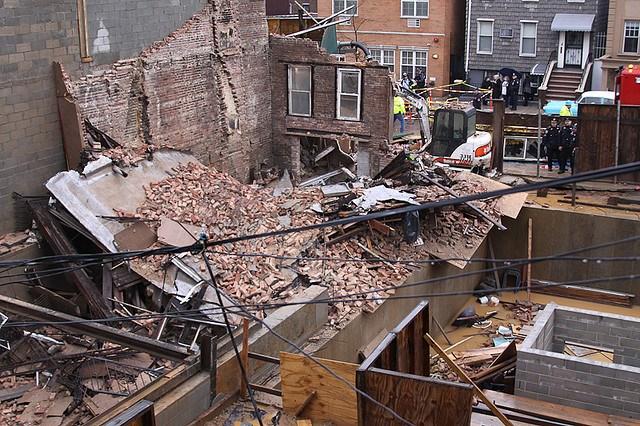
Last week, we talked about the latest report from the U.N. IPCC describing the impacts that have already been seen from climate change and some projections of what we might expect in the future. The report found that, “Climate change poses the greatest risks to the most vulnerable populations within all nations, and a potentially existential risk to poorer countries already struggling with food insecurity and civil conflict, as well as low-lying small island states.”
But most of us are not in that group, so we’re okay, right?
Not necessarily. The report “recognizes that risks of climate change will vary across regions and populations, through space and time, dependent on myriad factors including the extent of mitigation and adaptation.”
In other words, there is a great deal of uncertainty in predicting specific risks, and the results depend a great deal on the actions we take or don’t take.
Another report came out last month, this one by a cross-disciplinary group at NASA, based on the Human and Nature Dynamical (HANDY) model. The model was created by a team of natural and social scientists led by mathematician Safa Motesharrei of the National Socio-Environmental Synthesis Center, which is funded by the National Science Foundation. The study has been accepted for publication by the peer-reviewed journal Ecological Economics.
The study states that in the past a number of highly sophisticated, complex civilizations such as the Roman, Han, Mauryan and Gupta Empires, along with numerous Mesopotamian Empires, have collapsed, and it draws parallels among the conditions that made each of these susceptible.
Considering the growing awareness of our own vulnerability, we would be well advised to pay attention to these results.
The study found that the most critical factors in determining the risk of collapse pertain to Population, Climate, Water, Agriculture and Energy.
Perturbations among these factors could combine to set the stage for collapse if they lead to "the stretching of resources due to the strain placed on the ecological carrying capacity," and "the economic stratification of society into Elites [rich] and Masses (or "Commoners") [poor]."
The report says that these social phenomena have played "a central role in the character or in the process of the collapse," in all such cases over "the last 5,000 years."
Hmmm. That doesn’t sound at all like us, does it? “Strain on ecological carrying capacity,” “economic stratification,” “Elites” and “Commoners.”
But that was a long time ago, and they didn’t have the kind of technology we have now. We’re so much smarter than they were. This could never happen to us.
According to the report, "Technological change can raise the efficiency of resource use, but it also tends to raise both per capita resource consumption and the scale of resource extraction, so that, absent policy effects, the increases in consumption often compensate for the increased efficiency of resource use."
Sounds a bit like the Jevons paradox, which most authorities agree holds true to some extent, though not necessarily to the point where all savings achieved by efficiency are consumed.
Here are a couple of scenarios described in the report.
“Even using an optimal depletion rate and starting with a very small number of Elites, the Elites eventually consume too much, resulting in a famine among Commoners that eventually causes the collapse of society. It is important to note that this Type-L collapse is due to an inequality-induced famine that causes a loss of workers, rather than a collapse of Nature."
It’s a bit like the inhabitants of a house using timbers from the home's foundation to keep the fire burning in the fireplace.
In another scenario, "with a larger depletion rate, the decline of the Commoners occurs faster, while the Elites are still thriving, but eventually the Commoners collapse completely, followed by the Elites."
The wealth of the Elites insulates them from many of the impacts, while also motivating them to resist making important structural changes, since the status quo serves them so well. This pattern was evident in the collapse of both the Roman and Mayan empires.
Motesharrei and his team, after thoroughly exercising the model, conclude that under conditions "closely reflecting the reality of the world today... we find that collapse is difficult to avoid."
This is not to say that collapse is inevitable. The guidance that this work can offer is to focus on two things: moderate resource use and improved social equality.
Though these model-based scenarios are all hypothetical, they cover a very realistic range of options, and reinforcing what many people have been saying for a long time.
Image credit: Todd Shaffer: Flickr Creative Commons
RP Siegel, PE, is an inventor, consultant and author. He writes for numerous publications including Justmeans, ThomasNet, Huffington Post, and Energy Viewpoints. He co-wrote the eco-thriller Vapor Trails, the first in a series covering the human side of various sustainability issues including energy, food, and water in an exciting and entertaining romp that is currently being adapted for the big screen. Now available on Kindle.
Follow RP Siegel on Twitter.

RP Siegel (1952-2021), was an author and inventor who shined a powerful light on numerous environmental and technological topics. His work appeared in TriplePundit, GreenBiz, Justmeans, CSRWire, Sustainable Brands, Grist, Strategy+Business, Mechanical Engineering, Design News, PolicyInnovations, Social Earth, Environmental Science, 3BL Media, ThomasNet, Huffington Post, Eniday, and engineering.com among others . He was the co-author, with Roger Saillant, of Vapor Trails, an adventure novel that shows climate change from a human perspective. RP was a professional engineer - a prolific inventor with 53 patents and President of Rain Mountain LLC a an independent product development group. RP was the winner of the 2015 Abu Dhabi Sustainability Week blogging competition. RP passed away on September 30, 2021. We here at TriplePundit will always be grateful for his insight, wit and hard work.














